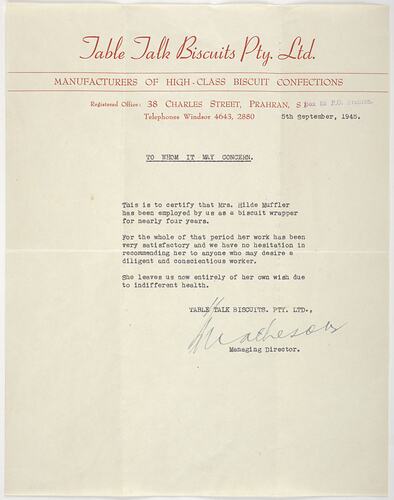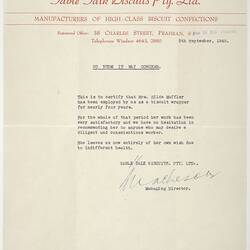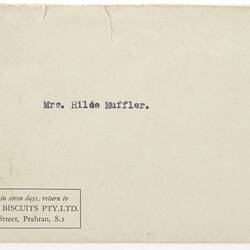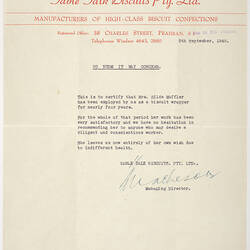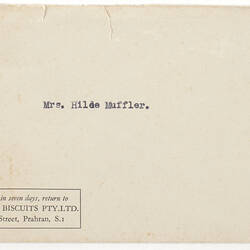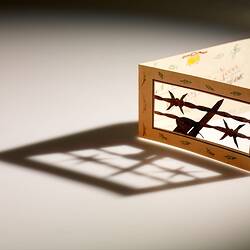Summary
This is a professional reference for Hilde Muffler [nee Mayer], wife of Karl Muffler, from her employer 'Table Talk' Biscuit Factory, 38 Charles Street Prahran. It is dated 5th September, 1945. It is a positive reference, describing Hilde's work as a biscuit wrapper for four years and referrring to her own decision to terminate her employment due to ill health. Karl Muffler, Hilde's husband, was interned as a German enemy alien at Tatura Internment Camp from 1939 to 1944, and was then released to the Civil Aliens Corp Melbourne on 27th June 1944. He was then transferred to Broadford until his release in 1945. Meanwhile Hilde, also a German migrant, was issued with a travel permit (which is also in this collection) and her movements were restricted to within 15 miles of Melbourne's General Post Office. Government regulations required 'enemy aliens' to register and limit their travel to between work and home and within a specified distance from the local post office. They had to obtain permission from the authorities to travel further or change residence. With Karl away, Hilde was forced to return to live with her parents and took the job at the biscuit factory. It was a difficult time for Hilde, separated fron her husband only six months after they married, and living a life under surveillance and suspicion.
This item relates to Karl Friedrich Muffler, qualified pastry chef and confectioner, born in 1900, who migrated to Melbourne from Germany in 1930, aboard the passenger liner 'Balranald'. Muffler quickly established himself in Melbourne, commencing employment with Bill Ikinger (who had recruited and sponsored him) at his cake shop in Brunswick, as well as joining the long-running German establishment 'Club Tivoli'. Muffler went on to establish his own business, 'The Embassy' in Malvern, and in 1939 married fellow German migrant Mathilde 'Hilde' Mayer. At this time they were members of the 'German Labour Front' of which Adolf Mayer (Hilde's father) was president. On 4th September, 1939 Karl Muffler, along with dozens of other German residents (including his father-in-law), was placed into police custody as an enemy alien. He was transferred to Tatura internment camp and while there undertook woodcarving and drafting classes and worked as a cake decorator. He was transferred to a Forestry Commission camp in Broadford, and finally released in 1945. With no family left in Germany he decided to stay in Australia and became naturalised in 1947. After the war, Muffler accepted a position at William Angliss Food Trades School in Melbourne teaching ex-servicemen new skills in cake decoration. He maintained a connection to the German community though Club Tivoli and died in 1996.
Description of Content
Reference for Hilde Muffler, nee Mayer, from her employer 'Table Talk' Biscuit Factory, 38 Charles Street Prahran, dated 5th Sept. 1945. Positive reference describing Hilde's work as a biscuit wrapper for 4 years and that she was leaving due to ill health. Reference typed on paper with 'Table Talk Biscuits', red masthead, enclosed in envelope (slit open) with 'Mrs. Hilde Muffler' on front.
Physical Description
Reference typed on paper with 'Table Talk Biscuits', red masthead, enclosed in envelope (slit open) with 'Mrs. Hilde Muffler' on front.
Significance
This rich and diverse collection enables the exploration of a number of important historical themes, relating to migration as well as broader work and wartime narratives. Of key interest is the theme of working life and the proactive transporting of commercial and culinary traditions to Australia via the immigration process. Represented are the operational activities of pastry businesses around Melbourne in the 1930s, brought to life through tools and business records. The theme of internment and restriction of 'enemy aliens' during World War II can be explored through documents, mementoes, drawings, tokens and internment craft, and this collection is complemented by a large number of documents relating to Muffler held by the National Archives of Australia.The collection also provides a comprehensive overview of a migrant's experience: from garnering qualifications in country of origin to migrating; establishing a working life as practitioner and teacher; community connections and the subsequent consequences of those activities; the establishment of a domestic and social life, through marriage and ongoing cultural links; and the experiences of loss through separation through relocation, and loss of family due to war.
More Information
-
Collection Names
-
Collecting Areas
-
Acquisition Information
Donation from Ms Sue Muffler, 27 Apr 2005
-
Date Created
38 Charles Street, Prahran, Greater Melbourne, Victoria, Australia, 05 Sep 1945
-
Presented To
Mrs Hilde Muffler (née Mayer), Prahran, Greater Melbourne, Victoria, Australia, 1945
-
Inscriptions
Text: Table Talk Biscuits Pty. Ltd./MANUFACTURERS OF HIGH-CLASS BISCUIT CONFECTIONS/Registered Office: 38 CHARLES STREET, PRAHRAN, S1 Box 32 P.O. Prahran/Telephones Windsor 4643, 2880 5th September, 1945./TO WHOM IT MAY CONCERN.
-
Classification
Migration, Settlement - employment, Training & employment records
-
Category
-
Discipline
-
Type of item
-
Overall Dimensions
204 mm (Width), 260 mm (Height)
-
Keywords
Cake Decorating, Forestry Camps, German Communities, German Immigration, Internment Camps, Pastry Making
